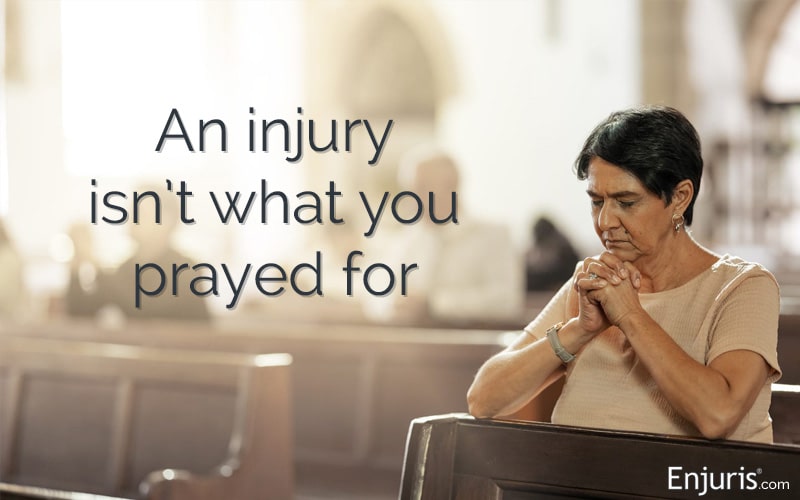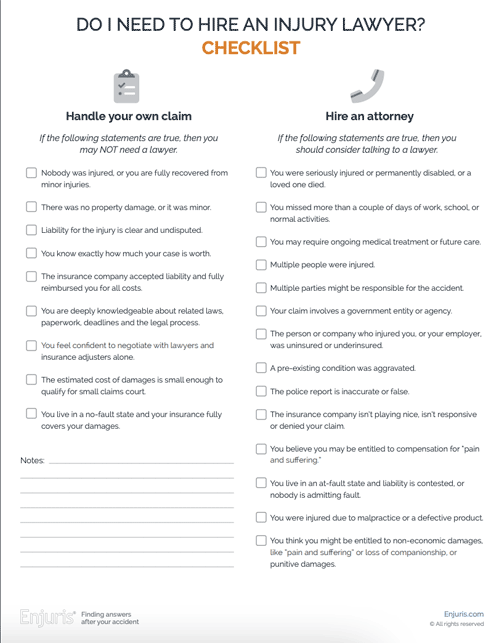
We know the Constitution protects religious freedoms, but does that mean a religious institution can’t get sued?
Constitutional religious freedom is not related to civil personal injury lawsuits; if you were injured in a religious institution or at an event, you’re entitled to recover for your injuries.
When people attend a religious event or visit a place of worship, their thoughts are usually on the spiritual and the divine. They're generally not thinking about personal injury, but accidents can happen anywhere—even in places that feel sacrosanct. When an injury occurs at a church, mosque, temple, or during a religious event, what are the options for legal recourse? Are houses of worship immune from legal liability?
We hear a lot about the U.S. Constitution protecting religious freedom, and that can be confusing because it can be hard to separate the physical building where religion happens from the laws for personal injuries.
Are religious institutions immune from personal injury lawsuits?
It's a common misconception that religious organizations are entirely immune from legal action for personal injuries. The truth is somewhat more nuanced.
Why do people believe religious institutions are immune?
Sometimes people misunderstand the purpose of our Constitutional amendments. Amendments that govern things like freedom of speech, freedom of religion, and others, protect us from the government infringing on our rights. They do not protect us from private entities.
For example, when a person stands on a public street corner and says things that might be disagreeable to other people, the police cannot step in and arrest them for what they say—the police are hired by state or local municipal bodies. They represent the government, and the words are being spoken on a public street; therefore, they are protected under the First Amendment freedom of speech.
However, if that person is in a restaurant and saying objectionable things to others, the restaurant manager has a right to remove them from the premises. The restaurant is a private business whose manager does not represent the government. The individual has no freedom of speech rights in that circumstance.
The same is true for freedom of religion.
The First Amendment protects religious institutions from government intervention, leading some to think this extends to civil liability.
Historically, some jurisdictions protected charitable organizations, including religious institutions, from certain types of liability. But this only goes so far. Religious institutions are generally not immune from lawsuits involving personal injury. They have a duty of care toward attendees, just like any other property owner. However, there are exceptions and additional protections in place for religious activities that are considered constitutionally protected.
Common types of injuries that might happen at a religious institution or event
- Slips, trips, and falls
- Injuries from falling objects
- Burns or scalds from candles or incense
- Food poisoning from community meals
- Injuries in playgrounds or other facilities within the religious property
In reality, these are the same types of injuries that people could experience anywhere; there’s nothing specific to their being related to a religious gathering or institution.
Additional legal considerations when filing a lawsuit against a religious organization
Filing a lawsuit against a religious institution isn't much different than filing one against any other entity, but there are additional elements to consider.
What to do for any lawsuit:
- Consult a medical professional. First, get medical treatment and document your injuries.
- Gather evidence. This could include photographs of the hazard that caused the injury, video surveillance footage, or witness accounts.
- Consult a lawyer. Personal injury cases involving religious institutions can be legally complex. Consulting a personal injury lawyer who has experience in this area is crucial.
Differences between lawsuits against religious institutions and other entities
Just like individuals consider their constitutional protections, courts can be wary of becoming involved in religious matters. There are political and constitutional considerations, and many courts (and lawyers) hesitate to become entangled in these issues.
While less common today, some states still extend partial immunities to charitable organizations, which could include places of worship.
In addition, given the respect accorded to religious institutions, there might be public relations considerations.
Personal injury claims against religious institutions tread the fine line between civil law and constitutionally protected freedoms. While religious institutions aren't generally immune from personal injury lawsuits, the legal landscape is certainly more complex. If you find yourself injured in a place of worship or during a religious event, consult a personal injury lawyer familiar with the specific challenges these cases present. Your physical and spiritual well-being are important, and so are your legal rights.

Sample accident journal/diary to help you document the effect on your daily life
Download in PDF format

Can you handle your own claim, or should you hire an attorney? Use this worksheet to determine when you should consider hiring a personal injury or workers' comp lawyer.
Download in PDF format
